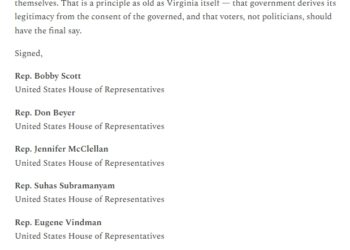U.S. Immigration and Customs Enforcement (ICE) is an unreliable partner that crafted an unauthorized and unfunded detention mandate woven from the whole cloth of anti-immigrant bias to the detriment of local communities. It is time to focus on what local communities do well and wash local hands of this mess.
Joseph Montano attempted to clear up the confusion about responsibilities of state and local jurisdictions and the liabilities associated with ICE detainers yesterday, addressing the Central Virginia Regional Meeting of the Virginia Coalition for Immigrant Rights in Charlottesville. Cooperation with ICE has the unintended consequence of eroding public safety while redirecting funding from other public functions.
ICE detainers are requests to local law enforcement to hold the person in the request for up to 48 hours. Discretion to enforce those requests rests with local law enforcement. There is no legal requirement to comply with them. But there has been a complete disconnect between federal and local officials.
This morning I was looking up local websites and on the Arlington County website I was looking at their frequently asked questions with detainers. … on their website there’s a question “Can Arlington elect not to honor and immigration detainer issued by ICE?” And the answer to that said “No. All state and local officials are required by federal law to honor ICE detainers.” – Joe Montano; Virginia ACLU
ICE detention requests do not provide a basis for retention on their own. They are often issued by a lone ICE officer without due process, without review, and without a judicial warrant. Their sole purpose is to investigate whether a person has committed a civil immigration offense. Detaining a person after they’re eligible for release without probable cause is a violation of the 4th Amendment. Further, responding to these requests is fairly expansive. By responding to these requests, local law enforcement is acting as a proxy for federal enforcement without reimbursement for the period until ICE assumes actual custody. Not only does the local jurisdiction assume the burden of that cost, it also assumes liability for potential damages from lawsuits over wrongful imprisonment.
The supposed purpose of ICE detainers is to get serious criminals off the street. However the evidence shows that the vast majority of persons detained have no prior criminal record or have only committed a minor traffic offense. 34% of ICE detainers issued in Virginia are for persons with no criminal record at all.
The threat of detention enables perpetrators to take advantage of their victims or results in victims being detained after calling for help. He pointed to the case of Maria Bolanos who called police when she sought protection after a fight with her partner. Police responded and she wound up being charged with illegally selling a $10 phone card to a neighbor. That charge, later dropped, made her a criminal in the eyes of ICE and led to a deportation order. “If that happened in one case,” asked Montano, “why would anyone want to reach out for help if they don’t have a lawful immigration status? If they know that it’s something that could happen to them. They are hesitant to reach out for help and they are less likely to aid the police if they do see a crime being committed.”
Further, ICE frequently makes mistakes including the detention of U.S. citizens. In one such case, a U.S. citizen and army veteran was detained for 7 months despite multiple attempts to prove his citizenship due to a misspelling of his name in ICE records.
Montano summed it up with this: In order to put our communities first what we really need to do is ensure local communities reduce or completely eliminate their compliance with ICE detainers. Every day ICE detainers are violating constitutional rights, draining scarce local resources, and undermining law enforcement’s relationship with the community. Across the United States, a growing number of localities are choosing not to honor ICE detainers because of their questionable legality and the cost and the community impact. Over 100 cities and counties across the United States have restricted their compliance with ICE detainers. “I think it’s about time that Virginia did that.”

![[UPDATED with Official Announcement] Audio: VA Del. Dan Helmer Says He’s Running for Congress in the Newly Drawn VA07, Has “the endorsement of 40 [House of Delegates] colleagues”](https://bluevirginia.us/wp-content/uploads/2026/02/helmermontage.jpg)
















